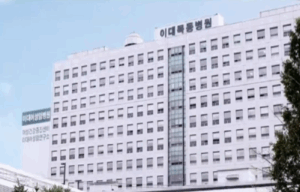Thyroid cancer
Disease description
This is a malignant tumor that develops from the glandular epithelium of the thyroid gland. This type of cancer most often manifests as a nodule, usually detected during an ultrasound examination or palpation of the neck.
Symptoms that require seeking diagnosis and treatment:
- Enlargement (nodule) in the thyroid gland
- Change in voice
- Difficulty swallowing
- Enlargement of cervical lymph nodes
- Pain in the neck or ear due to tumor pressure on surrounding tissues and nerves
- Fatigue, weakness
- Weight changes
Diagnosis and treatment
Diagnosis
To diagnose thyroid cancer, advanced examination methods are used, such as sonoelastography, computed tomography, magnetic resonance imaging, and biopsy followed by cytological and histological analysis.
Treatment
Treatment methods include surgical tumor removal using minimally invasive technologies (laparoscopic and robotic surgeries), radioactive iodine therapy to destroy residual tumor cells, and targeted therapy aimed at blocking specific molecular mechanisms of tumor growth.
After thyroid removal, patients are often prescribed hormone replacement therapy (HRT) to maintain normal hormone levels in the body. It helps compensate for the loss of the natural thyroid function, supporting metabolic balance and preventing possible complications associated with thyroid hormone deficiency.
Innovations in leading global clinics
In addition to radioactive iodine therapy, the main treatment for thyroid cancer remains surgery. In advanced countries such as South Korea, surgeries are performed with the Da Vinci robotic system. This innovation allows complex surgical procedures to be carried out with higher precision and minimal incisions.
One innovative approach to robotic surgery was proposed by Korean surgeon Dr. Chung from Seoul. He suggested using an axillary approach to the thyroid gland, which avoids incisions on the neck. Access to the thyroid gland through the armpit significantly reduces aesthetic consequences for the patient.
Clinics specializing in the treatment of thyroid cancer
-
 Seoul, South Korea Asan Medical Center
Seoul, South Korea Asan Medical Center -
 Jerusalem, Israel Hadassah Medical Center
Jerusalem, Israel Hadassah Medical Center -
 Petah Tikva, Israel Medical Center “Rabin”
Petah Tikva, Israel Medical Center “Rabin” -
 Geneva, Switzerland Hirslanden Clinique La Colline
Geneva, Switzerland Hirslanden Clinique La Colline -
 Geneva, Switzerland Generale-Beaulieu
Geneva, Switzerland Generale-Beaulieu -
 Istanbul, Turkey Acibadem Altunizade
Istanbul, Turkey Acibadem Altunizade -
 Istanbul, Turkey Acıbadem Ataşehir Clinic
Istanbul, Turkey Acıbadem Ataşehir Clinic -
 Antalya, Turkey Hospital Medical Park Antalya
Antalya, Turkey Hospital Medical Park Antalya -
 Dubai, UAE NMC Healthcare
Dubai, UAE NMC Healthcare -
 Istanbul, Turkey Hospital “Memorial Şişli”
Istanbul, Turkey Hospital “Memorial Şişli” -
 Milan, Italy San Donato Hospital in Milan, Italy
Milan, Italy San Donato Hospital in Milan, Italy -
 Milan, Italy San Raffaele University Hospital
Milan, Italy San Raffaele University Hospital -
 Abu Dhabi, UAE Burjeel Hospital Abu Dhabi
Abu Dhabi, UAE Burjeel Hospital Abu Dhabi -
 Vienna, Austria Debling Private Clinic
Vienna, Austria Debling Private Clinic -
 Heidelberg, Germany Heidelberg University Hospital
Heidelberg, Germany Heidelberg University Hospital -
 Hamburg, Germany Asklepios Nord Heidberg
Hamburg, Germany Asklepios Nord Heidberg -
 Dusseldorf, Germany FKKD Clinical Complex
Dusseldorf, Germany FKKD Clinical Complex -
 Winterthur, Switzerland Clinic "Lindberg"
Winterthur, Switzerland Clinic "Lindberg" -
 Incheon, South Korea Gil Medical Center at Gachon University
Incheon, South Korea Gil Medical Center at Gachon University -
 Lausanne, Switzerland Clinique Montchoisy
Lausanne, Switzerland Clinique Montchoisy -
 Nyon, Switzerland Clinique Genolier
Nyon, Switzerland Clinique Genolier -
 Istanbul, Turkey “Memorial Ataşehir” Clinic
Istanbul, Turkey “Memorial Ataşehir” Clinic -
 Barcelona, Spain QuironSalud Barcelona Hospital
Barcelona, Spain QuironSalud Barcelona Hospital -
 Barcelona, Spain Medical Center "Teknon"
Barcelona, Spain Medical Center "Teknon" -
 Barcelona, Spain University Hospital Barnaclinic+
Barcelona, Spain University Hospital Barnaclinic+ -
 Madrid, Spain University Clinic HM Madrid
Madrid, Spain University Clinic HM Madrid -
 Madrid, Spain University Hospital HM Monteprincipe
Madrid, Spain University Hospital HM Monteprincipe -
 Gebze, Turkey Anadolu Clinic
Gebze, Turkey Anadolu Clinic -
 Zurich, Switzerland Hirslanden Clinic
Zurich, Switzerland Hirslanden Clinic -
 Madrid, Spain Quiron Salud University Hospital
Madrid, Spain Quiron Salud University Hospital -
 Lugano, Switzerland Saint Anna Clinic
Lugano, Switzerland Saint Anna Clinic -
 Geneva, Switzerland Clinique des Grangettes
Geneva, Switzerland Clinique des Grangettes -
 Seoul, South Korea Samsung Medical Center
Seoul, South Korea Samsung Medical Center -
 Seoul, South Korea Medical Center at Ewha Womans University
Seoul, South Korea Medical Center at Ewha Womans University -
 Seoul, South Korea SNUH
Seoul, South Korea SNUH


































